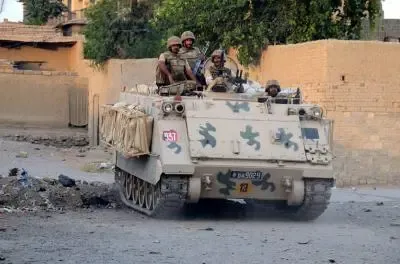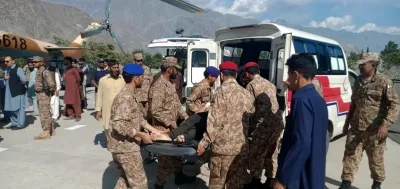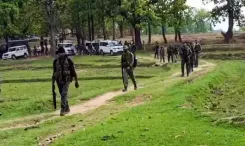Are Taliban Border Assaults Escalating Pakistan's Internal Crisis?

Synopsis
Key Takeaways
- Taliban attacks have intensified along the Durand Line.
- Pakistan's airstrikes aim at TTP militants.
- Rising tensions threaten regional stability.
- Diplomatic efforts are crucial for resolution.
- Insurgency and economic issues plague Pakistan.
New Delhi, Oct 12 (NationPress) In a surprising act of retaliation, commencing late Saturday, the Taliban forces from Afghanistan have allegedly caused significant damage to Pakistan's border installations along the Durand Line.
Rising tensions have resulted in numerous skirmishes along this contentious border, leading to sporadic closures and adversely impacting one of Pakistan’s key transit points, especially for trade with the landlocked nation.
The clashes intensified into a synchronized exchange of gunfire following Islamabad's abrupt increase in airstrikes on Afghan cities, notably including the capital, Kabul, earlier this week.
This escalation coincided with the visit of Afghanistan’s Foreign Minister, Amir Khan Muttaqi, to India.
During his diplomatic and trade discussions with India’s Foreign Minister, S. Jaishankar, a joint declaration was issued, which, much to Pakistan's dismay, reaffirmed that Jammu and Kashmir is part of India.
In an official statement on October 10, Jaishankar expressed gratitude to Afghanistan for its strong condemnation of the April 22 terrorist attack in Pahalgam, which resulted in 26 fatalities.
Islamabad was further incensed by Muttaqi’s assertion that terrorism is an internal matter for Pakistan.
Defence Minister Khawaja Asif issued a stern warning, asserting that Pakistan reserves the right to enter Afghan territory to combat groups he accused of targeting Pakistan.
Kabul has consistently denied these claims, insisting that Afghan soil will not be used against any country, particularly its neighbors.
Afghanistan’s Ministry of Defence previously cautioned Pakistan regarding violations of its airspace and earlier airstrikes on Paktika.
While Pakistan’s Foreign Ministry has refrained from directly confirming the recent bombings in Kabul, it stated that these operations were part of "legitimate counterterrorism measures" aimed at militants operating across the border, according to Khaama News.
Reports indicate that Pakistan's airstrikes targeted Tehreek-e-Taliban Pakistan (TTP) hideouts and were intended to eliminate one of its leaders, Noor Wali Mehsud.
Shortly after the Taliban's assault commenced, former US Ambassador to Afghanistan and Iraq, Zalmay Khalilzad, shared on Social Media X: "Today’s intense fighting was initiated by #Afghanistan in response to Pakistan’s airstrikes earlier in the week. The broad ground attacks appear aimed at retaliation and deterrence. #Afghanistan #Pakistan".
Just two days prior, the former diplomat, known for facilitating the 2020 US-Taliban peace agreement, remarked: "The Pakistanis have been recklessly supporting ISIS operatives against Afghanistan and their own Baluch nationalist insurgency," further adding, "Military escalation between #Pakistan and #Afghanistan is not the solution. It is unlikely to succeed and will escalate death and destruction in both nations."
He advocated for dialogue between Kabul and Islamabad to address the terrorist safe havens on both sides of the Durand Line, concluding with the tag “#USA”.
Pakistan is currently facing a multifaceted crisis that threatens its internal stability and regional security. The escalation in the border area has exacerbated the issues faced by a federal government already dealing with numerous economic, political, and diplomatic challenges.
Islamabad is already struggling with a rising insurgency in Balochistan and Pakistan-occupied Kashmir (PoK), violent confrontations in Khyber Pakhtunkhwa, a resurgence of Islamist extremists, and a deteriorating economic situation, plunging the nation into turmoil. Pakistan now finds itself entangled in the consequences of its past decisions to foster and support various militia groups to spread instability and terror in the region.










